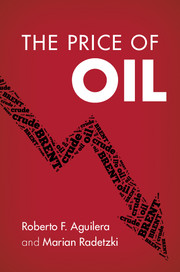Book contents
- Frontmatter
- Contents
- Figures
- Tables
- Acknowledgments
- 1 Introduction and overview
- PART I OIL'S EXTRAORDINARY PRICE HISTORY: HOW CAN IT BE EXPLAINED?
- 2 The price of oil since the early 1970s: observations and implications
- 3 OPEC and its behavior cannot explain oil's price performance
- 4 Can depletion and rising costs explain the price developments?
- 5 State ownership, government greed and the slowdown of capacity expansion
- 6 The resource curse and capacity destruction
- PART II THE SHALE AND CONVENTIONAL OIL REVOLUTIONS: LOW PRICES AHEAD
- PART III GLOBAL IMPLICATIONS FOR THE MACROECONOMY, THE ENVIRONMENT AND FOR POLITICS
- CONCLUSIONS
- References
- Index
4 - Can depletion and rising costs explain the price developments?
from PART I - OIL'S EXTRAORDINARY PRICE HISTORY: HOW CAN IT BE EXPLAINED?
Published online by Cambridge University Press: 05 November 2015
- Frontmatter
- Contents
- Figures
- Tables
- Acknowledgments
- 1 Introduction and overview
- PART I OIL'S EXTRAORDINARY PRICE HISTORY: HOW CAN IT BE EXPLAINED?
- 2 The price of oil since the early 1970s: observations and implications
- 3 OPEC and its behavior cannot explain oil's price performance
- 4 Can depletion and rising costs explain the price developments?
- 5 State ownership, government greed and the slowdown of capacity expansion
- 6 The resource curse and capacity destruction
- PART II THE SHALE AND CONVENTIONAL OIL REVOLUTIONS: LOW PRICES AHEAD
- PART III GLOBAL IMPLICATIONS FOR THE MACROECONOMY, THE ENVIRONMENT AND FOR POLITICS
- CONCLUSIONS
- References
- Index
Summary
To an economist, the clear case of depletion is a situation where supply becomes ever more expensive either because a shrinking physical resource volume arrests output growth, or on account of rising costs due to a degrading quality of the resources remaining in the ground. The stagnant output volume or the rising costs of output will push up prices, plausibly motivating the development of oil prices such as has actually occurred since the beginning of the 1970s. This chapter provides evidence to refute the assertion that depletion in the above sense has been an important driver of oil price developments since then.
Before venturing into the subject proper of the present chapter, we wish to remind our readers of two more general circumstances that cast serious doubts on the asserted role of depletion on price. First, we note that oil prices in real terms during several decades prior to 1972 experienced a gently falling trend at levels far below those which prevailed in subsequent periods. This occurred despite a growth in global consumption in the 1950s and 1960s of close to 8 percent per annum. Why then, should the effects of depletion have hit oil prices only in the subsequent decades, when growth in usage settled at below 1.5 percent? And second, how could it be plausibly explained that depletion created havoc for oil prices after 1972, but not for the equally depletable group of metals and minerals whose prices rose only moderately from the early 1970s onwards? Surely, to paint a credible picture of oil's price performance after 1972, while giving attention to these circumstances, factors other than depletion must have been at play.
HAVE SUPPRESSED VOLUMES OF OIL IN THE GROUND RESTRAINED OUTPUT?
It may be useful to define a few concepts central to the elaborations contained in this section. Proved reserves are defined as quantities of oil in identified fields that can be economically extracted at concurrent prices, using state of the art technology. Note that considerable investment in exploration, i.e., the search for and identification of oil volumes, is needed to establish reserves. Companies in extractive industries will generally tend to create reserves only up to a level required for their long-run production planning.
- Type
- Chapter
- Information
- The Price of Oil , pp. 32 - 41Publisher: Cambridge University PressPrint publication year: 2015



